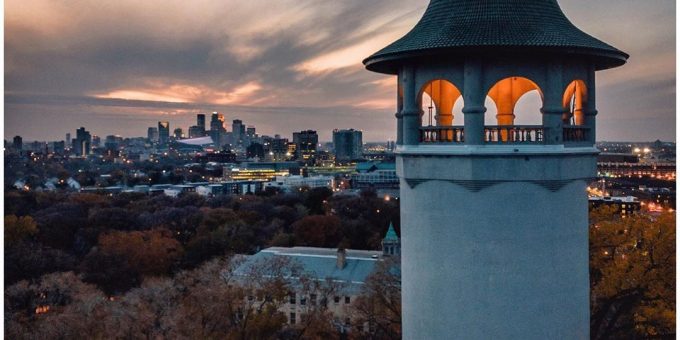
Today, in honor of the one-year anniversary of the killing of George Floyd, The Society Pages reposts Walt Jacob’s introduction to the Wonderful/Wretched series. Wonderful/Wretched is a collection of twenty-one essays on the racial dynamics of the Twin Cities written by social scientists with ties to the metro area. Wonderful/Wretched has since been revised and expanded in a published volume, Sparked: George Floyd, Racism, and the Progressive Illusion available through the Minnesota Historical Society. For the remainder of the summer, in celebration of Sparked’s publication, and in reflection of the year that has passed since the uprising for racial justice last summer, The Society Pages will repost essays from Wonderful/Wretched in their original form.
We are all shocked and saddened by the tragic events in Minneapolis, Minnesota over the past few days. As human beings, many of us are overwhelmed by the complexity of the situation and the intense emotions it has created. As members of an institution that strives for social justice, we feel discouraged and outraged. And, as social scientists, we are wondering how our disciplines and our knowledge can contribute to solutions. I have three thoughts about steps we can take.
So began a May 29, 2020 email I sent to the College of Social Sciences at San José State University (SJSU), where I am the dean. The May 25, 2020 murder of George Floyd by a Minneapolis police officer and subsequent protests about police brutality and other injustices faced by Black people in the U.S. – both peaceful and violent – have many social scientists wondering, what can I do to help repair the many fractures in American society that seem to be getting worse each day? The first step, of course, is to educate ourselves about the issues, especially about the history and culture of the place at the epicenter of the most recent conflagration.
The January 8, 2020 article “When Minneapolis Segregated,” for example, analyzes how racial housing covenants in Minneapolis blocked home sales to people of color from the early 1900s to an official end in 1948 (but with unofficial enforcement for many years afterwards), establishing patterns of inequality that still persist to this day. The article notes, “Despite its reputation for prosperity and progressive politics, Minneapolis now has the lowest rate of homeownership among African American households of any U.S. city.” [For additional information about the operation of racial covenants in Minneapolis, see the University of Minnesota’s Mapping Prejudice project.] The June 6, 2020 CityLab article “Why This Started in Minneapolis” provides a more recent exploration of the origins of the national uprising.
My letter to the college included a paragraph about being on the faculty at the University of Minnesota-Twin Cities for 14 years. In addition to checking in with friends and former colleagues who are still in Minnesota, I had conversations with folks who’d left the area, and these chats inevitably included discussions about Minnesota’s progressive reputation. Wendy Thompson Taiwo (Assistant Professor of African American Studies at SJSU) noted that her time in Minnesota was “wonderful and wretched for people of color like us.” That struck a nerve with me, as my time was also filled with both amazing and awful moments. After mulling over our conversation for a few days, I thought, as a component of educating others about the fraught racial landscape of the Twin Cities, why don’t I collect some stories about the good, the bad, and the ugly of life for people who were former residents but now have some distance to critically reflect on their experiences? This special section of The Society Pages is the result!
I started by asking several social scientists of color with ties to the Twin Cities to discuss their memories of racial dynamics in the Twin Cities, specifically about the intersections of wonderful and wretched components of life in the area. Their essays will be posted over the next few weeks. My essay – “Blackasotan Identity Lanes” – starts the conversation.
My email to the SJSU College of Social Sciences concludes, “I am energized by helping others get through the difficult times caused by COVID-19 and various social instabilities. And we WILL get through this disheartening period, and then redouble our efforts to make the world a more just and democratic place.”
Reflections in the Wonderful/Wretched Series
- “Blackasotan Identity Lanes” by Walt Jacobs
- “A Letter to an Old Friend about Race” by Darren Wheelock
- “Will Words Lead to Action?” by Marcia Williams
- “My Beautiful, Broken Minnesota” by Rachel Raimist
- “In This Country” by Catherine Ceniza Choy
- “Reflections on an Exceptional State” by Richard Lee
- “The Sound of the Police” by Jerry and Sarah Shannon
- “Minnesota’s First Posthumous Pardon” by Garrick Percival
- “Black Life and Death in Minnesota” by Wendy Thompson Taiwo
- “Rethinking Minnesota Nice” by Danielle Lavin-Loucks
- “Bless Me with a Name” by Özlem Ersin
- “In Transit” by Thomas X. Sarimento
- “Start the Conversation” by Jocelyn Gutzman
- “Everybody’s Going Uptown” by Rodolfo Aguilar
- “Mass Movements; Moral Moments” by Donna Gabaccia
- “Luna Lovers” by Mario Alberto Obando
- “Gesturing Towards Tenuous Inclusion” by Jasmine Mitchell
- “Learning the Music and Diversity Scales in My Minneapolis” by Neeraj Rajasekar
- “All Roads Lead to 38th and Chicago” by Anna DalCortivo
- “Where Were You on May 25, 2020?” by Walt Jacobs
- [Coda] “A Wrinkle in Time and Space” by Walt Jacobs
The series is no longer accepting submissions. If you have comments please contact Walt Jacobs at walt.jacobs@sjsu.edu.
